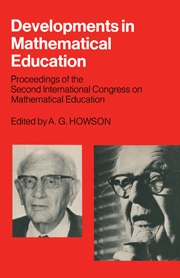 Developments in Mathematical Education
Developments in Mathematical Education Book contents
- Frontmatter
- Contents
- Editor's Acknowledgements
- PART I A CONGRESS SURVEY
- PART II THE INVITED PAPERS
- As I read them
- Comments on mathematical education
- The Presidential Address
- What groups mean in mathematics and what they should mean in mathematical education
- Nature, man and mathematics
- Some anthropological observations on number, time and common-sense
- Mathematical education in developing countries – some problems of teaching and learning
- Some questions of mathematical education in the USSR
- Modern mathematics: does it exist?
- PART III A SELECTION OF CONGRESS PAPERS
- Appendices
- Index
Mathematical education in developing countries – some problems of teaching and learning
from PART II - THE INVITED PAPERS
- Frontmatter
- Contents
- Editor's Acknowledgements
- PART I A CONGRESS SURVEY
- PART II THE INVITED PAPERS
- As I read them
- Comments on mathematical education
- The Presidential Address
- What groups mean in mathematics and what they should mean in mathematical education
- Nature, man and mathematics
- Some anthropological observations on number, time and common-sense
- Mathematical education in developing countries – some problems of teaching and learning
- Some questions of mathematical education in the USSR
- Modern mathematics: does it exist?
- PART III A SELECTION OF CONGRESS PAPERS
- Appendices
- Index
Summary
The original invitation to me to address the Conference suggested as a topic ‘The Psychology of Mathematics Education’. For two main reasons I have chosen to go off at something of a tangent. First, Shulman's brilliant paper in the 1970 NSSE ‘Yearbook’ represents so careful and thoughtful an analysis of current Western thinking on the psychology of mathematics education that it would be both presumptuous and superfluous for me to attempt to improve on it. Secondly, my colleagues and I at Macquarie University in Australia have been concerned, over the last five years or so, with some problems related to the education of children in developing countries and I thought it might be more useful, and interesting, to discuss some of our findings with you than to recapitulate what has already been so well described by Shulman.
The central concept in much of our work has been that of ‘Educability’, operationally defined as ‘the probability that children will learn what they are supposed to learn’ – and with the factors, both genetic and environmental, which affect this (Philp, 1967). The initial emphasis, although not the only one by any means, has been on factors related to cognitive development, essentially because so much of the current theory and practice of curriculum development and teaching methods is dependent on notions about the nature of cognition.
- Type
- Chapter
- Information
- Developments in Mathematical EducationProceedings of the Second International Congress on Mathematical Education, pp. 154 - 180Publisher: Cambridge University PressPrint publication year: 1973
- 4
- Cited by


